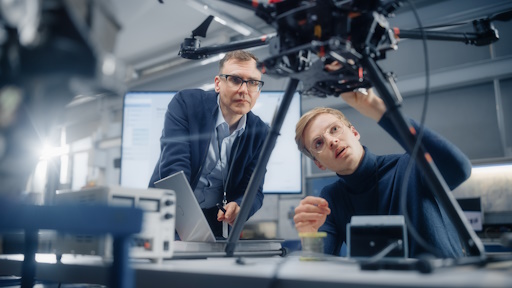Innovation Management Consulting
Generate market-oriented ideas systematically and lead them to success
If you want to be successful in the long term, you have to constantly innovate. This requires a creative, networked and efficient innovation department. We work with industrial companies to master challenges in the innovation environment - from strategic focus to process optimization. Our solutions are based on six key characteristics of innovative companies:
- The innovations have a strategic focus.
- The innovation portfolio is actively managed.
- The innovation process is efficiently designed.
- The sources of innovation are widely scattered.
- The innovation is deliberately realized with third parties in the sense of combinatorics.
- The spirit of innovation is anchored in the organizational culture.
Innovation strategy as an orientation framework for innovation management
The innovation strategy defines the direction in which to close sales gaps or gain new market share. This requires a comprehensive understanding of the industry and the factors that determine competition. In addition, two issues need to be clarified:
- What is the significance of incremental, radical, disruptive or architectural innovations for the company's development?
- What innovation contribution should the company make in innovation networks / what position should it occupy in the innovation value chain?
The innovation strategy thus defines the search fields for new ideas and sets the framework for portfolio planning.
EFESO supports you in the development of your innovation strategy with:
- Strategy Reviews
- Innovation Audits
- IoT Audits
- Business area analyses
- Design of strategy processes
- Market and technology trend analyses
- Smart analytics
- Scenario Planning
- Delphi surveys
A particular focus of EFESO's consulting services is the strategic analysis of the digital networking possibilities of products and processes (IoT / Internet of Things / Industry 4.0) and their impact on your company's innovation requirements.

Develop an innovation roadmap and manage the innovation portfolio
Active portfolio management focuses on the effective use of resources (personnel, capital, etc.) in the innovation fields. The spotlight is on agile portfolio management. This makes it possible to evaluate, select and implement the continuous flow of new ideas in a targeted and flexible manner. The overarching goal here is to achieve a balanced project portfolio and ensure the company's economic performance.
Align innovation organization and innovation portfolio with sustainability
In addition to economic requirements, a modern innovation portfolio also takes into account sustainability requirements for products and systems. Reducing or avoiding the environmental impact of product manufacture and use is one of the most important challenges. After all, criteria such as reduced use of materials, durability, reparability, recyclability, reliability and minimal consumption of resources (energy, raw materials, etc.) are becoming increasingly important competitive factors.
Together with EFESO, your company can solve the following innovation management tasks:
- Carrying out an innovation inventory.
- Development of an innovation roadmap.
- Portfolio mapping of projects.
- Determination of the risk/return exposure.
- Design of agile control processes.
- Designing selection processes and criteria for innovation projects.
- Targeted involvement of other companies and external parties in the process of combinatorial innovation.
Creating efficient innovation processes with Design Thinking and much more
In the early innovation phases, the focus is on creative approaches to generating ideas and agile process models that rely on rapid feedback to avoid waste: these include rapid prototyping, set-based engineering and minimum viable products. In late innovation phases, the emphasis is on more stringent, planned process models such as product industrialization.
A particular challenge in designing efficient innovation processes is the increasing intelligence and networking of products. Whereas innovation processes used to be primarily hardware-driven, software now dominates the innovation process in many industries. Many companies have to adapt accordingly: Away from the one-off delivery of a finished product and towards "service packages" that are constantly changing via software releases (feature innovations).
EFESO supports you in the development of efficient innovation processes with:
- Design Thinking
- Lean Startup methods
- Iterative or agile product development processes
- Lean Agile development
Frugal innovation and development
Fast feedback cycles in development enable companies to optimally harmonize their development efforts and customer added value. In line with the principle of "do better with less", frugal innovation is about realizing high-quality products with clear customer benefits – and doing so with the lowest possible, sustainable use of resources.
Establish the principles of frugal development in your company with EFESO. We support your developers in turning these principles into successful products. We offer you a comprehensive portfolio of effective methods for this purpose:
- Core use case- and Design Thinking-workshops to radically focus developments on the core customer benefit.
- Pattern-based solution approaches for the development of "frugal products".
- Introduction of adaptive and customer-focused development processes in modern collaboration networks.
- Mindset and improvement program to anchor frugal ideas and principles in your employees, based on our successful Human Dynamics approach.




